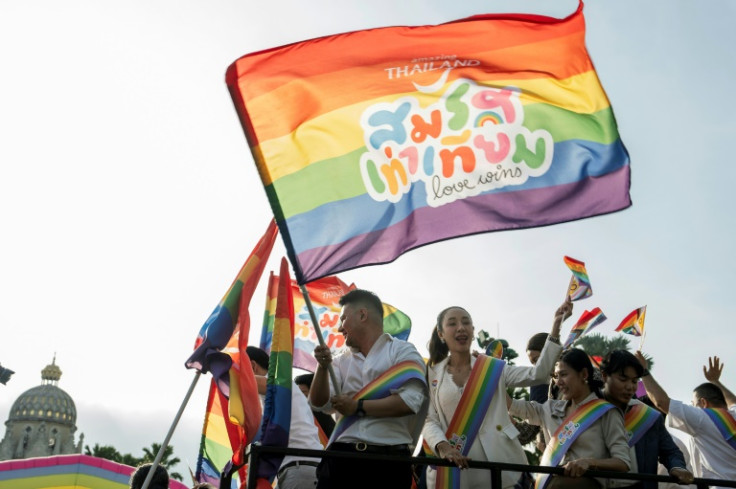
Hundreds of same-sex couples are set to tie the knot in Thailand on Thursday as it becomes by far the largest nation in Asia to allow equal marriage.
A mass LGBTQ wedding in the capital, organised by campaign group Bangkok Pride with city authorities, expects hundreds of marriage registrations as the law comes into effect.
Transgender woman Ariya "Jin" Milintanapa, who has waited two decades for this moment, told AFP she was "psyched".
"This day is important not just for us, but for our kids as well. Our family will finally become one," she said.
Thailand ranks highly on indexes of LGBTQ legal and living conditions, and public attitudes, and Thursday's milestone makes it the first Southeast Asian country to allow equal marriage.
The kingdom's same-sex marriage bill was passed in a historic parliamentary vote last June, the third place in Asia to do so after Taiwan and Nepal.
The law was ratified by King Maha Vajiralongkorn in October and comes into effect after 120 days.
The law on marriage now uses gender-neutral terms in place of "men", "women", "husbands" and "wives", and also grants adoption and inheritance rights to same-sex couples.
More than 30 countries around the world have legalised marriage for all since the Netherlands became the first to allow same-sex unions in 2001.
Couples will be able to register at the main mass wedding at Bangkok's central Siam Paragon shopping mall and district offices nationwide from 8:00 am on Thursday.
It marks the culmination of years of campaigning and thwarted attempts to pass equal marriage laws.
Prime Minister Paetongtarn Shinawatra said during a celebratory photoshoot last week: "No matter your gender or who you love, love knows no limits or expectations. Everyone will be protected under the same laws."
Thailand has long had an international reputation for tolerance of the LGBTQ community, and opinion polls reported in local media have shown overwhelming public support for equal marriage.
However, much of the Buddhist-majority kingdom retains traditional and conservative values and LGBTQ people say they still face barriers and discrimination in everyday life.
Thai activists have been pushing for same-sex marriage rights for more than a decade, with their advocacy stalled by political turbulence in a country regularly upended by coups and mass street protests.
Siritata Ninlapruek, an LGBTQ activist, described the journey as a challenging, bittersweet battle.
"I am extremely happy, but my fight for the community continues," she said.
She emphasised the need for gender identity recognition beyond biological sex.
"Whether male, female or non-binary, people should have the right to identify as they wish."







